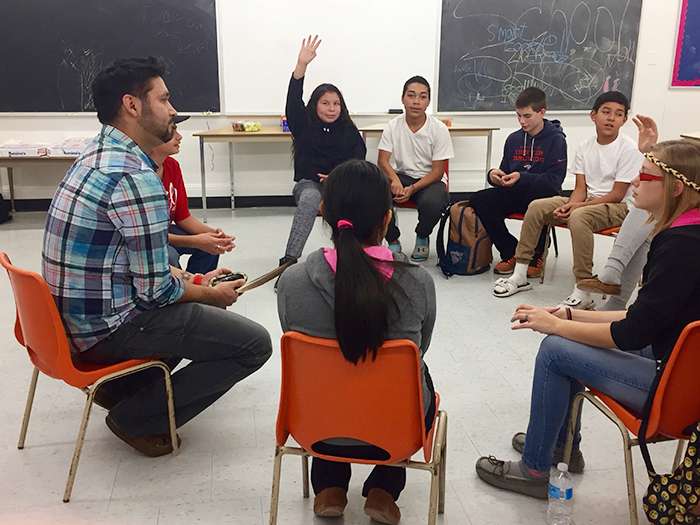Mentors improve Indigenous student mental health, academic success

Claire Crooks, director of the Faculty of Education's Centre for School Mental Health, led a team that implemented a mentorship program for Grade 7 and 8 Indigenous students in the Thames Valley District School Board (TVDSB).
Groups of students met once a week with an Indigenous adult mentor. Their sessions focused on acquiring skills, in areas like stress management, and combined them with spiritual, physical, mental and emotional teachings based on the traditional First Nations medicine wheel.
Crooks followed the students for two school years – 2011-12 and 2012-13. Study results, which were recently published in the Journal of Primary Prevention, showed those who received mentorship from a member of their community had better cultural connectedness, improved mental health and higher school credit accumulation than peers who were not mentored.
"Knowing who you are is an important task for any youth," Crooks said. "This program was able to help these Indigenous students develop a positive sense of identity tied to their culture. We can now show with real evidence that when they feel better about themselves, know who they are and understand where they came from, there are hugely positive impacts in almost all other areas of their lives."
A total of 105 students were followed over the two-year period. Crooks and her team reviewed student report cards and standardized test scores, annually surveyed and interviewed participating students, and spoke with principals and teachers.
Results showed stronger academic success and a markedly increased sense of cultural awareness and pride among mentored students. The mentoring group also scored higher on positive mental health.
Though the study is over, the mentorship program at TVDSB continues to operate. For mentor Mike Cywink, the meetings are a chance to impart what he knows on the younger generation, while also getting something back himself.
"I see the students as teachers for me, as well," Cywink said. "When I talk about our culture with them, they get enthused and say things like, 'We want to educate other people about this.' It makes me take a look at myself to ask if I'm out there doing that as much as I should."
Cywink felt it was his direction to work with Indigenous youth, to ensure the cultural perspective and teachings continue to be passed along.
"When I work with these students, I see them listening to me and see that I can provide them the tools and the courage to be the voice for the next group of kids," he said. "Ultimately, I want them to one day be in my position, but to do it better than me and take it further. There's so much potential in them, I know they can do it."
Paul McKenzie, superintendent of student achievement in the First Nation, Metis and Inuit (FNMI) portfolio with the TVDSB, says mentorship participants are working with school staff and students to raise awareness and help build a sense of belonging.
"Mentored students bring an understanding of their backgrounds and communities to the schools, and in doing so really help serve to bring this into our collective identities as well," McKenzie said.
As Canada's Indigenous youth continue to be disproportionately affected by struggles with mental health, suicide and higher than average rates of leaving school, and the country looks to implement calls to action presented in the Truth and Reconciliation Commission report, Crooks hopes the study will spark conversations in Canadian schools about the role they can play in the success of today's Indigenous youth.
"Ministries of education have an obligation to provide programming and supports that are inclusive of Indigenous culture and ways of knowing. For a long time, our school systems weren't designed to meet the needs of these youth. This study shows educators can partner with Indigenous communities to make a profound and important difference for these students, and the evidence proves it really does work."
Provided by University of Western Ontario
















